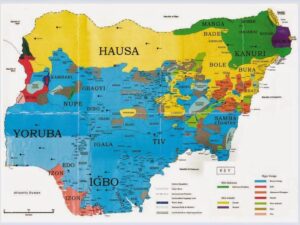Nigeria can currently be seen as a country ruled by alien laws not those of its people. A country is supposed to be governed by people-oriented laws that dictate how the people therein conduct themselves. In the case of Nigeria, the laws in most parts have almost never been made by the people.

The Restructuring of Nigeria has been one of the hottest debates of recent times. Nearly everyone in Nigeria believes the country should be restructured for better administration. One can see that Nigeria has never really gotten a perfect structure for an effective administration but this leaves one to ask, what will be a good model for Nigeria’s governance?
Throughout the history of Nigeria, one may see that for the most part, the people’s interest has not been prioritized in most aspects of the country’s constitution. This whole event calls for the restructuring of the country. It may seem as if the people of Nigeria have never been carried along in the affairs of the country’s governance.
Nigeria as a political entity has been a product of business. Some of the first recorded history of Nigeria is among the Portuguese explorers. Afterward, the British would come after British explorers like Mungo Park and the Lander brothers.
The missionaries as well did have their part in the whole journey and the entry of the royal Niger Company. These events will later transform into the transfer of authority to the colonial administration where Britain takes over as the colonial masters. The countries that the British met and what was left behind are as different as day and night. The whole situation is a form of injustice to the people that now inhabit what’s today known as the Federal Republic of Nigeria.
In all these, different approaches have been taken to shape the affairs of the areas known today as the Federal Republic of Nigeria. We can all agree that the British did what they had to do for ease of administration or in the best aspect an unquestioned administration; however, over half a century since they left, Nigeria has not yet recovered from the shock of that change of trajectory.
As time continued, the British would rule Nigeria for several decades between the country’s amalgamations in 1914 and independence in 1960. Shortly after independence, the country’s first republic would be cut short by a military coup. This will introduce a rule by decree. There was a return to democracy shortly afterward before the military struck again and another rule by decree was the case.
By 1999, there was another return to democracy which survived to today; however, while Nigeria seems a democracy, the constitution was one of military handover. It never really took input from the people or reflected our uniqueness. Before long the inefficiency of the current constitution began to manifest. The feelings of the people can’t be neglected forever.
The interesting thing is that Nigerians seem to have an uncommon sense of an independent identity. Even the smallest nationality within the country wants to be identified uniquely rather than be recognized as members of a bigger nationality.
The need for restructuring Nigeria through a people-oriented constitution can’t be overemphasized. Even if the name of the country itself can be overlooked, a lot of other things have to be put into consideration. Should Nigeria remain one or not? This has been an age-long question. There is no straightforward answer to that. But our suggestion which is better for now is the restructuring of the country.
Such restructuring may or may not impact many aspects of the constitution. Often people may think that what Nigeria needs is a constitutional restructuring but some of us believe what Nigeria needs is for indigenous people to operate outside the constitution.
It is likely that perhaps there is more autonomy for ethnic people in Nigeria; these problems will start evolving solutions. It is one thing to see Nigeria as one country and another to have the people feel the same.
From the perspective of most Nigerians, they possibly want to see a United Country but wish to appreciate their unique ethnicity as well. Most administrations especially the military have tried to ensure that Nigerians see themselves first as Nigerians before any other view; however, this has been a misunderstanding by people who prefer the country be seen as such.
Maybe patriotism can be revived if Nigerians can be encouraged to see themselves first as Igbo, Hausa, or Yoruba before seeing themselves as Nigerian. This is seemingly the most workable model for the country.
Conclusion
Often the biggest problem is the easiest to solve. It may seem like restructuring Nigeria is a constitutional affair. But for the most part, what needs to change is the way the law of the land sees the people. To see the people for who they truly are, for who they want to be. Maybe after that, we can come together and realize that Nigeria is great for all of us.
 Home
Blog
Home
Blog